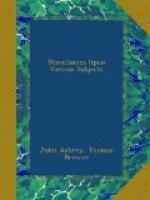" —– La chose en demeure la, jusquez a 5. ou 6 heures du soir du mesme jour, ou un tremblement de Terre survenant, Ils reconnurent par experience, que cequ’ils m’avoient intendu dire avant Midy, n’estoit que trop vray.”
i. e.—–The matter rested there, till about five or six of the clock in the evening of the same day, when an earthquake coming suddenly upon us; experience made them recollect and acknowledge that, what they had heard me say before noon, was but too true.
“Envoyee au R. P. Andre Castillon Provincial de la Province de France par les Missioners de Peres de la Compagnie de Jesu. Imprime a Paris, 1664.”
i. e. Sent to the reverend father Andrew Castillon, provincial of the province of France, by the missioners of the fathers of the Society of Jesus. Printed at Paris, 1664.
“Livy makes mention, that before the coming of the Gauls to Rome, Marcus Ceditius, a Plebeian, acquainted the Senate, that passing one night about twelve o’clock through the Via Nova, he heard a voice (bigger than a man’s) which advised him to let the Senate know, the Gauls were on their march to Rome. How those things could be, it is to be discoursed by persons well versed in the causes of natural and supernatural events: for my part I will not pretend to understand them, unless (according to the opinion of some Philosophers) we may believe that the air being full of intelligences and spirits, who foreseeing future events, and commiserating the condition of mankind, give them warning by these kind of intimations, that they may the more timely provide and defend themselves against their calamities. But whatever is the cause, experience assures us, that after such denunciations, some extraordinary thing or other does constantly happen.”
IMPULSES.
Cicero “de Natura Deorum”, lib. 2.
“PRAETEREA ipsorum Deorum saepe praesentiae, quales supra commemoravi, —– declarant, ut ab his, & Civitatibus, & singulis Hominibus consuli. Quod quidem intelligitur etiam significationibus rerum futurarum, quae tum dormientibus, tum Vigilantibus portentantur. —– Nemo vir magnus sine aliquo afflatu divino unquam fuit”.




